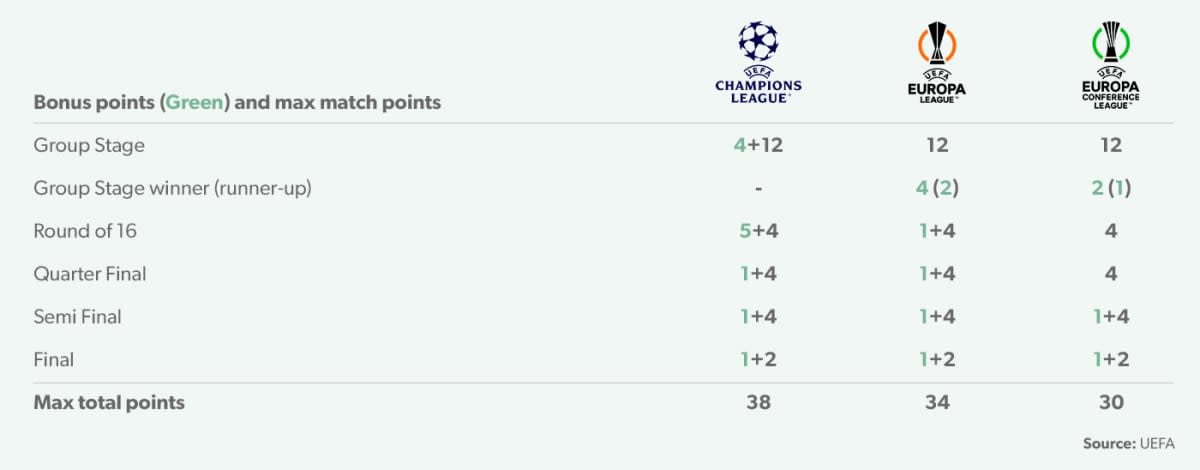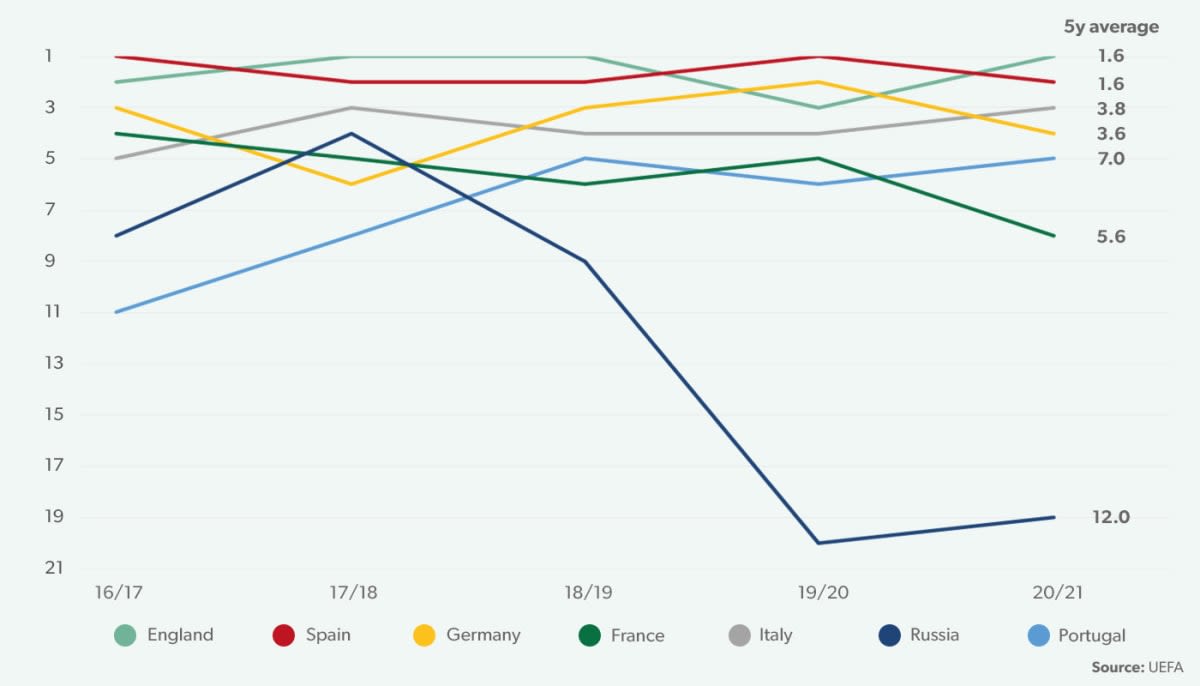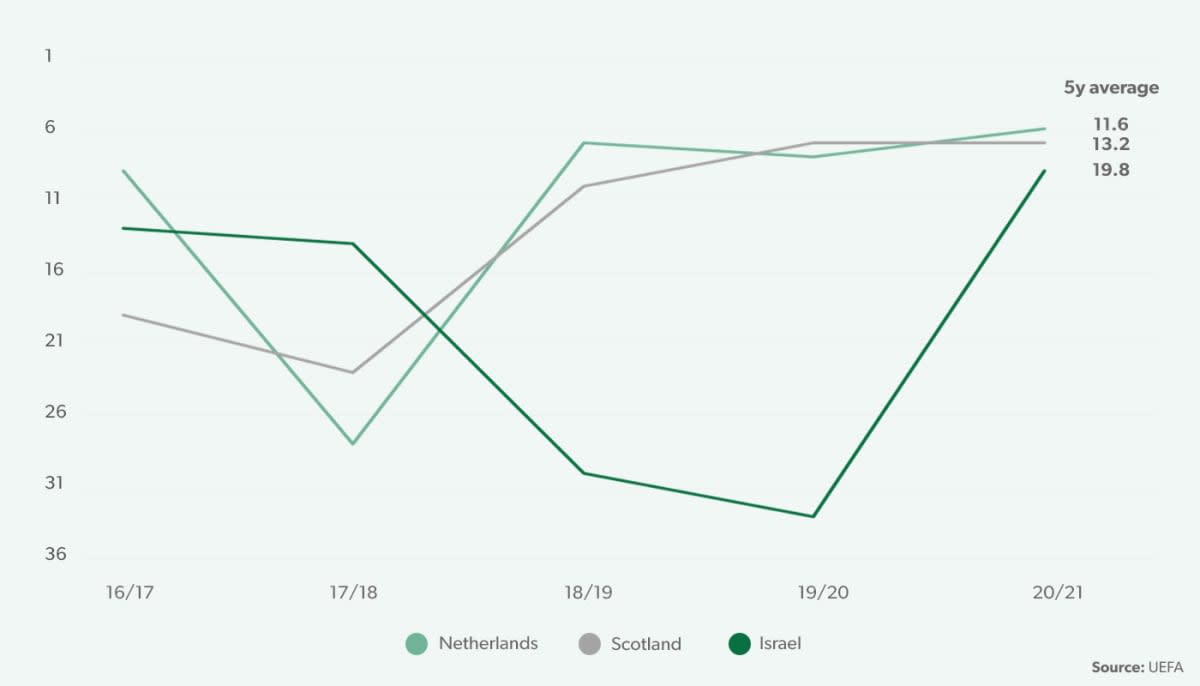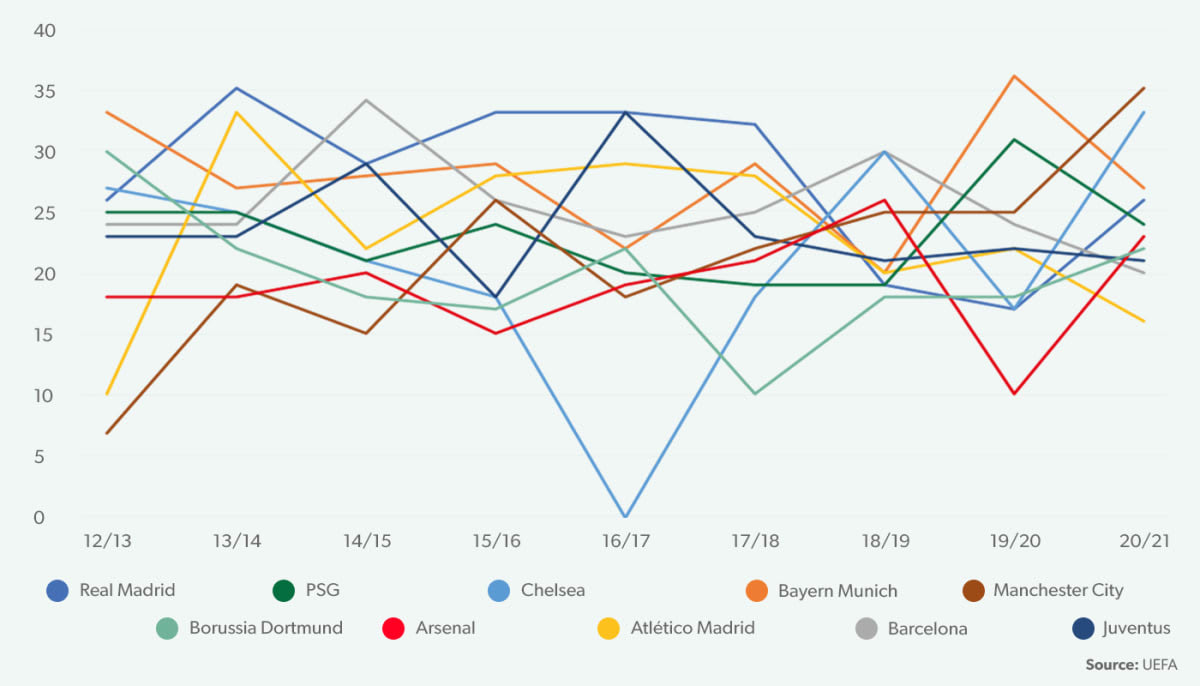UEFA coefficients are based on the performance of clubs in the European Cups during rolling five-year periods. There are two types of coefficient – a country coefficient and a club coefficient, which are interdependent.
The performance of its clubs determines the ranking of each National Association (NA), which in turn determines the number of clubs it may enter into UEFA’s European competitions

During each rolling five-year period, match results are awarded (2 points for a win and 1 point for a draw) from the group stage of Champions League (CL), Europa League (EL), and Europa Conference League (ECL) onwards, with the exception of the knockout round after the EL group stage and the ECL group stage. A bonus point is awarded for reaching the quarter finals (except in the ECL), semi-finals and finals. Qualification for the group-stage of the Champions League is awarded with 4 bonus points, qualification for the round of 16 of the Champions League is awarded with 5 bonus points, and qualification for the round of 16 of the Europa League is awarded with 1 bonus point.

There are also bonus points for the winners and runners-up of the EL and ECL group stages: 4 bonus points for the winners of the EL groups, 2 bonus points for the runners-up of the EL groups, 2 bonus points for the winners of the ECL groups, and 1 bonus point for the runners-up of the ECL groups. Qualifying rounds are rewarded with half-points, i.e. 1 point for a win and half a point for a draw.
National Association rankings
The UEFA country ranking is computed by taking an average of the total number of points divided by the total number of clubs of each country over the last five years. To determine the participants in UEFA European club football, the previous year’s ranking is used, allowing each country to know at the start of the season how many places it has. If countries (or clubs) have the same amount of points then the ranking is determined by the most recent season in which the yearly coefficients differ.
As shown in the below chart, England and Spain have been the top two National Associations over the past five seasons, except in 2019/20 when Germany pushed England into third place. Italy has been in the top four in four of the past five seasons, while France slipped out of that group in 2017/18 and has not regained its place, falling as far as 8th place in 2020/21. Portugal has been the beneficiary, rising from 11th to 5th over the past four seasons through the consistent CL qualification of SL Benfica and FC Porto and the latter’s progress to the Quarter Finals in both 2018/19 and 2020/21.

Real Madrid and Barcelona placed first and second in the club rankings every year between 2012/13 and 2018/19
Three nations on the rise:
Scotland
Significant improvement was shown following the 2017/18 season, with Scotland climbing from 23rd to finishing 7th in both 2019/20 and 2020/21 seasons. Scotland’s main clubs in European competitions are Celtic FC and Rangers FC, accounting for 43% and 40% of points respectively.
For Rangers, the appointment of Steven Gerrard as a manager in 2018 had positive results, with the club winning its first title in over a decade this past season. In terms of European football, Rangers has qualified for the group stages of the Europa League every year since Gerrard’s introduction, even advancing to Round 16 in 2019/20 and 2020/21. The success of the new era of Rangers team has already revitalised Scotland’s coefficient ranking, solidifying the nation as a top 10 member in European football.
Netherlands
The Netherlands has only two teams in the top 50 ranked clubs: AFC Ajax accounts for an impressive 60% of the Netherlands’ national association points, with PSV Eindhoven earning 38%. Their collective dip in form during the 2017/18 season was devastating for the ranking, with the Netherlands dropping to 28th in the world down from a respectable 9th.
This decline was due to Ajax not passing through the Champions or Europa League qualification stages, and PSV losing both their Europa League games. As these are the clubs amassing the vast majority of the Netherlands’ points, this had a catastrophic effect on their UEFA coefficient ranking. However, the Netherlands bounced back quickly to restore their ranking with Ajax featuring in the semi-final of the Champions League in 2018/19, and PSV appearing in the group stages.
Israel
Despite having no teams in the top 50, Israel placed 9th in the most recent UEFA association rankings. The nation has experienced a very unpredictable run of form, rising dramatically from 33rd place in 2019/20 to 9th the following season.
Israel’s dominant club, Maccabi Tel-Aviv FC, accounts for 84% of the points used in Israel’s ranking and is, therefore, pivotal to the nation’s success. The club rose from the 2019/20 season’s 93rd ranked team to placing 71st in 2020/21, due to their involvement in the Champions League second qualifying round, while another Israeli team, Hapoel Be’er Sheva, won two matches in their Europa League group stage. Israel’s UEFA rank is almost entirely dictated by the performance of Maccabi Tel-Aviv.

Three nations in decline:
Turkey
Turkey’s national association ranking declined from 7th in 2016/17 to 26th in 2020/21, consistently dropping each season. The country’s two clubs in the top 50 are Besiktas JK and Galatasaray AS. The main problem for Turkey is that these teams have been performing poorly in recent years, thus driving the association ranking down. Besiktas hasn’t appeared in the Champions League since 2017/18 and failed to pass through their group stage in 2019/20 and the qualifying round in 2020/21. Meanwhile, Galatasaray failed to win a group stage game in 2019/20 and failed to qualify for the group stages of the Europa league in 2020/21.
Belgium
The main issue with Belgian clubs is their inability to advance further than the group stages in the Champions League, with no club doing so for the past ten seasons. The two clubs that account for the majority of Belgium’s points are RSC Anderlecht and Club Brugge, ranking 41st and 42nd out of the top 50 teams. However, Anderlecht has failed to qualify for the European football in both the 2019/20 and 2020/21 season, resulting in Belgium dropping from 9th to 14th in the most recent rankings.
Russia
Over the past five seasons, Russia has plummeted from 8th to 19th in the rankings. The most significant drop was between the 2018/19 and 2019/20 seasons. This was due to CSKA Moscow finishing fourth in their Champions League group and FC Zenit failing to pass through their group stage as well. The struggle continued in the 2020/21 season, this time with both teams finishing at the bottom of their Champions League group, thus resulting in Russia’s drop in national association rankings.

Club Rankings
Club coefficients are based on the results in the current UEFA Champions League and UEFA Europa League season. The rankings, combined with those of the four previous campaigns, determine the number of points allocated to each nation.
Over the past ten seasons, Spanish teams have accounted for three of the top five ranked clubs with Real Madrid, FC Barcelona, and Atletico Madrid ranking first, third and fourth respectively. Furthermore, Spain has seven clubs ranking in the top 50, followed by England and Italy with six, Germany with five, while France and Portugal provide four clubs each.

